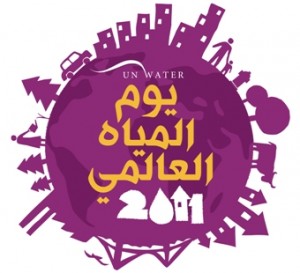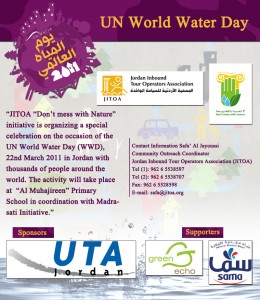 Jordan tourism environmental initiative “Don’t mess with Nature”, managed by the Jordan Inbound Tour Operators Association (JITOA), celebrates the UN- World Water Day 2011, to highlight the importance of preserving water resources and spreading awareness on the behaviors used to maintain water as well as showcasing water challenges in Jordan.
Jordan tourism environmental initiative “Don’t mess with Nature”, managed by the Jordan Inbound Tour Operators Association (JITOA), celebrates the UN- World Water Day 2011, to highlight the importance of preserving water resources and spreading awareness on the behaviors used to maintain water as well as showcasing water challenges in Jordan.
Saturday 19th March 2011, JITOA organize a volunteer activity on this occasion at “Al Muhajireen Primary School” in Amman, in coordination with the Royal “Madrasati Initiative” of H.M Queen Rania that works on repairing local schools in all parts of the kingdom.
The activity includes and educational interactive lecture conducted by JITOA partners Green-Echo initiative of Masar Center, who will talk about using water more efficiently and methods of saving water, explaining the water global hydrologic cycle in cities, highlighting the importance of water in cities and in human history, and explaining water situation in Jordan and how it is a major issue, in addition to demonstration of practical practices for saving the water in houses and schools, and how to use water more efficiently in order to reduce consumption. This activity is sponsored by the United Travel Agency, JITOA tour operator member.
This year JITOA celebrates in a more fun and interactive activity for students and volunteers by enjoying water Mural Painting Activity for drawing illustrations on the school play area walls reflecting the water life cycle in the cities and some slogans and symbols on saving water along with a specialized graphiti artist. Participants will receive a T-Shirt with the official logo in addition to a light snack provided by SAMA Natural Mineral Water, the official drink.
Mr. Mohammad Samih, JITOA Chairman that “Don’t mess with Nature” is an active Initiative in the Jordanian society, which strives to promote environmental awareness in various areas and to participate in all global festivities and efforts to put Jordan on the environmental map. As well as providing volunteering opportunities for employees in the tourism sector to help them get involved in local communities. He also commented on the occasion that the tourism sector considered from the leading sectors involved in water conservation, being a major consumer of water, especially in the peak summer and holiday season, when the water amounts diminishes with Jordan’s lack of water resources. He said "This day is a positive step towards involving local activities in global initiatives and a foot print for Jordan tourism sector in supporting environmental sustainability"
 International World Water Day is held annually on 22 March as a means of focusing attention on the importance of freshwater and advocating for the sustainable management of freshwater resources. The objective of World Water Day 2011 is to focus international attention on the impact of rapid urban population growth, industrialization and uncertainties caused by climate change, conflicts and natural disasters on urban water systems. This year theme, "Water for cities: responding to the urban challenge," aims to spotlight and encourage governments, organizations, communities, and individuals to actively engage in addressing urban water management.
International World Water Day is held annually on 22 March as a means of focusing attention on the importance of freshwater and advocating for the sustainable management of freshwater resources. The objective of World Water Day 2011 is to focus international attention on the impact of rapid urban population growth, industrialization and uncertainties caused by climate change, conflicts and natural disasters on urban water systems. This year theme, "Water for cities: responding to the urban challenge," aims to spotlight and encourage governments, organizations, communities, and individuals to actively engage in addressing urban water management.
Jordan is one of 4 poorest countries in water around the world; we have water scarcity problem, lack of precipitation and high temperature leading the water to evaporate. Water scarcity in Jordan will become an even greater problem over the next two decades as the population doubles and climate change potentially makes precipitation more uncertain and variable, particularly in this region.
On this occasion, it’s worth highlighting that Jordan water share per capita amount for 15% on the level of water poverty line, set to 1000 cubic meters per year by the International organization, and water resources share in the Arab world amount 6% of the total renewable water resources in the world, spreading over 15% of the world total area. According to the United Nations for International Development, about 80% of the waste water is dispensed without getting in the treatment process, due to lack of financial and technical capabilities and limited resources.
